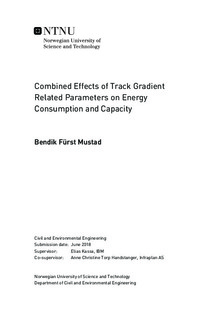Combined Effects of Track Gradient Related Parameters on Energy Consumption and Capacity
Master thesis
Permanent lenke
http://hdl.handle.net/11250/2564181Utgivelsesdato
2018Metadata
Vis full innførselSamlinger
Sammendrag
The predicted growth in passenger and freight traffic toward 2050 is considerable. To meet this growth, it is important to utilize new and existing railway infrastructure in a sustainable way. Track gradient could potentially have a large impact on operational parameters, which could again affect the sustainability of a railway line. It is therefore of scientific interest to study how these relate. The main goal of this study is to identify parameters that have the largest influence on the combined effect of energy consumption and capacity on a railway section.
Relevant parameters related to track gradient have been identified. Thus, an infrastructure model has been built in a microscopic model and run with scenarios combining different parameter levels. Outputs from the model were used to calculate the energy consumption and capacity. These responses were utilized to identify the critical parameters for the combined effect of capacity and energy consumption using a full factorial design.
The largest significant single effect for the combined outputs is the train mix. The single effect gradient direction and the interaction effect between train mix and gradient direction have also significant effect on the combined outputs of energy consumption and capacity.
Results from the study also imply that an increasing ascending track gradient does not have a significant effect on the track's capacity until heavy freight trains have trouble maintaining a reasonable speed. However, track gradient will considerably increase the energy consumption of the train operation for a train running uphill, and the effect will be much higher if combined with higher train speed and heavier train weights, the study implies.
